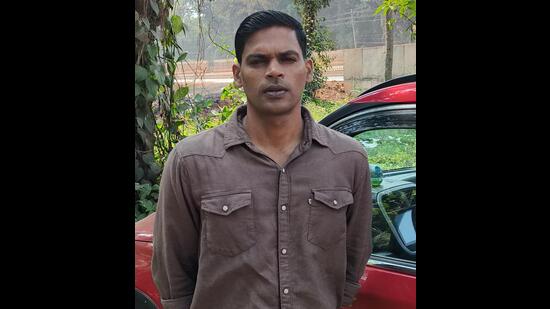Review: Chronicle of an Hour and a Half by Saharu Nusaiba Kannanari
A deeply immersive work, Kannanari’s Chronicle of an Hour and a Half offers an engaging study of the borrowed victimhood, fragile ego, petty insecurities, territorial energy and policing nature of the contemporary Indian male
“He gave me five children and then he rested, like God after Creation.” This arresting sentence is a premonition of what lies ahead in Saharu Nusaiba Kannanari’s debut novel Chronicle of an Hour and a Half, a contemporary sociopolitical drama suffused with dark truths about our age.

Set in Areekode in the Malappuram district of Kerala, this deeply immersive, polyphonic work begins with 49-year-old Nabeesumma’s laments. Her unsatisfactory marriage to Ahmad, a man as worthless as their five boys — Ibrahim, Imran, Dulqar, Rashid, and Burhan — has crushed her spirit. While she makes a living “scrubbing dishes, washing clothes, mopping floors, tailoring churidars and salwars and blouses…” these men vegetate.

Kannanari’s use of language throughout this book signals a maturity rare for a male author writing women. Sample what Nabeesumma notes about giving birth: that it felt like her “body was growing new limbs without my own consent.” The heteropatriarchal world coupled with a poverty-stricken, hand-to-mouth existence had sealed her fate and place in society. As the story slowly unfolds, Kannanari changes gears swiftly, introducing Reyhana, an equally troubled woman. Her twin daughters are studying medicine in Thrissur while her husband, Sadique, an “uxorious leech”, languishes in a flat in suburban Riyadh.
Fifteen at the time of her marriage, she had favoured “financial security” over a “handsome face”. But as the years rolled by, she realised that a marriage needs much more to work, from the “sexual unburdening” to a “healthy emotional bond”. Things were bad enough when a medical exigency introduces an organ she doesn’t want in her body, a proxy mangalsutra — her husband’s kidney. Thus, her dilemma is to “carry inside me a vital organ of a man I hate to call mine.” Until this, Chronicle... seems to be about power relations in a domestic setting. However, snake like, it begins to shed its skin, forcing its readers to face the hydra-headed monster that determines the trajectory of this action-packed novel — desire.
In a Freudian sense, that’s the prime mover and determinant of our decisions. There are a volley of questions to consider: Why would someone assume the authority to determine what’s honourable and what’s not? What makes society render respectability to particular forms of consensual acts of love, but not others? Who is to decide when to intervene in matters not involving themselves? If it weren’t for the self-serving desire of men, these questions would never arise. Kannanari’s Chronicle... offers a deeply engrossing and engaging study of the men of our times — their borrowed victimhood, fragile egos, petty insecurities, territorial energy and policing nature in relationships. Mixed together, all of it becomes a heady cocktail that leads to disaster.
Here’s a sample of some of these males: teenage Funny says, that nothing weighs on his mind like “the burden of my father. With him around even breathing is burdensome”; Chinnan confesses: “It’s always been my curse, this inability to keep a secret”; Imran is full of cocksure confidence: “I can sense trouble faster than a serpent”; and then there’s Fawaz’s conviction: “a woman is honourable only so long as she isn’t smuggling in a man when her husband isn’t home.”
Kannanari’s prose is laced with humour, too. Take Imam Shahnavaz’s sermon: “God is Made in China. He is in everything and he is everywhere. He is even in your phone. To doubt him, to mock him, to refute him is as useless and punishable as Marxism at 2am.” Kannanari’s prose demonstrates the role of humour in defamiliarizing the familiar and vice versa. It’s difficult to pull off unless the writer possesses impeccable observation skills. And Kannanari sees it all and allows it to seep into his fiction, letting the pulsating rhythm of his sentences achieve a “murderous tension”, a must-have quality according to German theorist Adorno.
Kannanari’s prose reflects this quality at a crucial moment in the book when Reyhana, for the first time, sets eyes on 25-year-old Burhan. She describes him as possessing a “virginal shine of new manhood” and “his eyes had a way of looking that liked being looked at.” Hyper awareness of Burhan’s masculinity, the antithesis of her husband, maddens her, disarraying her heart and mind, compelling her to choose between desire and fear. The dilemma is futile. Because here’s what she was meditating on right before she met Burhan: “Your dumb body knows it even before your wise mind figures it out.” She has already reached a point of no return. With the object of desire within reach, she decides to risk it all, thinking it’d be stupid to let this opportunity go and bracing herself for the inevitable, which comes knocking at Nabeesumma’s door.

As torrential rains heighten the drama of the landscape, Nabeesumma finds herself examining the men before her and concludes that they are “capable of rage beyond their control”. They warn her, ask her to mend Burhan’s ways, or else… Helpless, she wants to know more and follows them. Slips. Somewhere not far away, a few people see what happens. Without distrusting what they see in this fuzzy atmosphere, they pass off fiction as news, which reaches Nabeesumma’s sons first. In a fit of rage, they react.
Counter reaction soon follows. An array of people choose to broadcast the root cause of the feud on a hyperlocal WhatsApp group. Without deliberation it seems, consensus for the natural course of action is secured. A mass of uncontrollable people become one. Like God. Like mob. A bloodbath ensues. Gets recorded. Goes viral. The manner in which it’s recorded in Chronicle... cements the arrival of a fine literary talent.
Saurabh Sharma is a Delhi-based writer and freelance journalist. They can be found on Instagram/X: @writerly_life.






